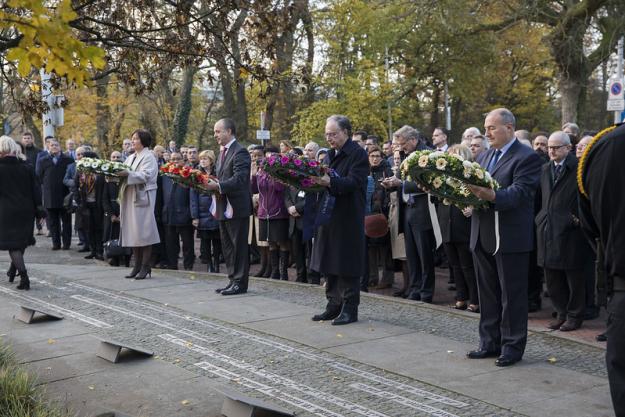
THE HAGUE, Netherlands – 29 November 2019 – The annual Day of Remembrance for All Victims of Chemical Warfare was observed today at the Headquarters of the Organisation for the Prohibition of Chemical Weapons (OPCW). A commemorative session was held in the Ieper Room, named after the site of the first large-scale chemical weapons attack in April 1915 in Ieper, Belgium.
The Chairperson of the Conference of States Parties, H.E. Ambassador Krassimir Kostov of Bulgaria presided over the session. Statements were given by OPCW Director-General, H.E. Mr Fernando Arias, as well as the Director-General for the Political Affairs of the Ministry of Foreign Affairs of the Netherlands, H.E. Mr Thijs van der Plas and the Deputy Mayor of The Hague, H.E. Ms Saskia Bruines.
OPCW’s Director-General noted: “On this day, we gather to respect the memory of victims and honour the courage of survivors” and added “This day is dedicated to their memory so that the tragic legacy of human suffering left by chemical weapons is never forgotten.”
To pay homage to the victims of chemical warfare, the dignitaries laid wreaths and observed a minute of silence at the memorial site.
The Day of Remembrance reaffirms the commitment of the OPCW to exclude completely the possibility of the use of chemical weapons. The ceremony was attended by representatives of State Parties to the OPCW, victims’ associations and international organisations.
Background
Each year, the Day of Remembrance for all Victims of Chemical Warfare provides an opportunity for OPCW Member States to pay tribute to the victims of chemical warfare and to reaffirm their commitment to exclude completely the possibility of the use of chemical weapons through the implementation of the provisions of the Chemical Weapons Convention.
As the implementing body for the Chemical Weapons Convention, the OPCW, with its 193 Member States, oversees the global endeavour to permanently eliminate chemical weapons. Since the Convention’s entry into force in 1997, it is the most successful disarmament treaty eliminating an entire class of weapons of mass destruction.
Over 97 per cent of all chemical weapon stockpiles declared by possessor States have been destroyed under OPCW verification. For its extensive efforts in eliminating chemical weapons, the OPCW received the 2013 Nobel Prize for Peace.
